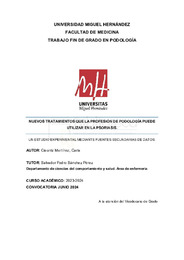Please use this identifier to cite or link to this item:
https://hdl.handle.net/11000/33281Nuevos tratamientos que la profesión de podología puede utilizar en la psoriasis. Un estudio experimental mediante fuentes secundarias de datos
| Title: Nuevos tratamientos que la profesión de podología puede utilizar en la psoriasis. Un estudio experimental mediante fuentes secundarias de datos |
| Authors: Ciaurriz Martínez, Carla |
| Tutor: Sánchez Pérez, Salvador Pedro |
| Editor: Universidad Miguel Hernández |
| Department: Departamentos de la UMH::Ciencias del Comportamiento y salud |
| Issue Date: 2024-05-28 |
| URI: https://hdl.handle.net/11000/33281 |
| Abstract: Introducción: La psoriasis es una enfermedad inflamatoria, autoinmune y crónica causada por factores genéticos, ambientales e inmunológicos con un gran componente psicológico ya que presenta un gran impacto en la calidad de vida del paciente. Afecta al 2-3% de la población mundial. La psoriasis puede presentarse de muchas formas, pero la principal manifestación son placas rojas y escamosas que aparecen en forma de brotes, siendo más frecuente en zonas como cuero cabelludo, manos, zonas de flexión (codos, rodillas, hendidura glútea) y de manera especial en los pies y las uñas. No existe una cura para la enfermedad, por lo que la terapia se basa en el tratamiento de estos síntomas. El tratamiento es individualizado y depende tanto del grado de afectación del paciente como de la presencia de otras comorbilidades. En este trabajo vamos a estudiar los fármacos biológicos que están indicados para la psoriasis en placas moderada-grave en pacientes con afectación en el miembro inferior. Estos, actúan inhibiendo la activación y maduración de las células presentadoras del antígeno. Risankizumab, Secukinumab, Guselkumab, Adalimumab, Ustekinumab y Deucravacitinib son los tratamientos biológicos en los que vamos a enfocar este estudio. Objetivos: Analizar qué fármaco biológico es el más efectivo en este tipo de pacientes. Material y métodos: Extracción de datos secundarios de pacientes de ensayos clínicos obtenidos a través de una búsqueda sistemática en PubMed y Scopus. En total se incluyeron 7 artículos. Resultados: La mayoría de estudios presentaron una efectividad de PASI 75 y PASI 90 en pacientes adultos, siendo un 55,55% hombres y un 44,45% mujeres. Se administró una dosis adecuada dependiendo del fármaco por vía subcutánea y vía oral. Discusión: En los 10 últimos años se ha evaluado la respuesta de los nuevos fármacos biológicos a adultos, donde todos los fármacos obtuvieron buenos resultados. Destacamos que Risankizumab fue el fármaco más utilizado en los estudios y con mayor beneficio en cuanto a baja dosis y rápida efectividad. Conclusiones: El tratamiento biológico más prometedor es el fármaco Risankizumab, que es el más beneficioso en relación a la dosis, la vía de administración y la breve duración de tiempo de tratamiento. Introduction: Psoriasis is an inflammatory, autoimmune and chronic disease caused by genetic, environmental and immunological factors with a large psychological component since it has a great impact on the patient's quality of life. It affects 2-3% of the world's population. Psoriasis can present in many ways, but the main manifestation is red, scaly plaques that appear in the form of outbreaks, being more common in areas such as the scalp, hands, flexing areas (elbows, knees, gluteal cleft) and especially on the feet and nails. There is no cure for the disease, so therapy is based on treating these symptoms. Treatment is individualized and depends on both the degree of the patient's involvement and the presence of other comorbidities. In this work we are going to study the biological drugs that are indicated for moderate-severe plaque psoriasis in patients with involvement of the lower limb. These act by inhibiting the activation and maturation of antigen-presenting cells. Risankizumab, Secukinumab, Guselkumab, Adalimumab, Ustekinumab and Deucravacitinib are the biological treatments on which we are going to focus this study. Objectives: Analyze which biological drug is the most effective in this type of patients. Material and methods: Extraction of secondary data from patients from clinical trials obtained through a systematic search in PubMed and Scopus. In total 7 articles were included. Results: The majority of studies presented an effectiveness of PASI 75 and PASI 90 in adult patients, with 55.55% men and 44.45% women. An appropriate dose depending on the drug was administered subcutaneously and orally. Discussion: In the last 10 years, the response of new biological drugs to adults has been evaluated, where all drugs obtained good results. We highlight that Risankizumab was the most used drug in the studies and with the greatest benefit in terms of low dose and rapid effectiveness. Conclusions: The most promising biological treatment is the drug Risankizumab, which is the most beneficial in relation to the dose, the route of administration and the short duration of treatment time. |
| Keywords/Subjects: psoriasis psoriasis en placas tratamiento biológico adultos miembro inferior |
| Knowledge area: CDU: Ciencias aplicadas |
| Type of document: info:eu-repo/semantics/bachelorThesis |
| Access rights: info:eu-repo/semantics/openAccess Attribution-NonCommercial-NoDerivatives 4.0 Internacional |
| Appears in Collections: TFG - Podología |
.png)

